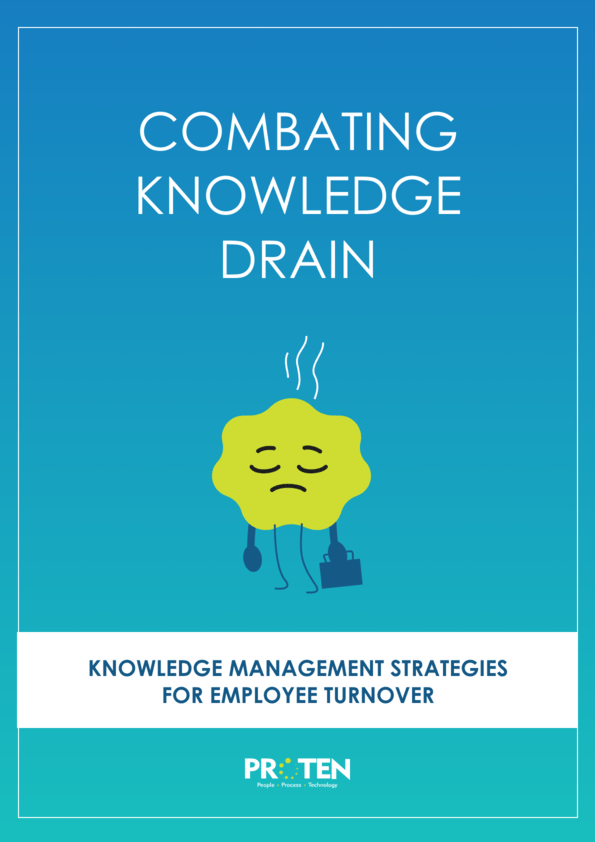Organisational Knowledge Management
Imagine posing a question in a group setting and finding out that no one knows the answer once a team member has left. This is a common theme in most organisations when they lose an employee—particularly a valuable one. According to IDC, up to 50% of corporate knowledge can’t be found centrally. This indicates that most employees spend more time re-creating previous knowledge than learning new information, stunting employee productivity.
Source: McKinsey, IDC, Panopto
Despite the best efforts of many organisations at employee retention, it is impractical to reduce turnover to zero as employees leave organisations for several reasons that have little to do with the organisation such as migration, career changes, and other personal reasons.
This means that employee turnover is a natural part of organisational dynamics. However, it can have detrimental effects if not managed properly. One of such detrimental effects is the loss of organisational or institutional knowledge. Organisational knowledge comprises all of a company’s valuable information that provides benefits to the organisation and its clients.
Knowledge drain due to employee turnover poses significant challenges for organisations. At the same time, successful knowledge-gathering, storing, and sharing can help organisations foster a culture of cooperation and curiosity. It can help companies increase productivity, employee satisfaction, and ROI. The next pages highlight key risks, best practices, and technological solutions that organizations can implement to ensure continuity and efficiency.
2. The Impact of Knowledge Drain
Source: Panopto
Due to inadequate knowledge management, employee productivity can suffer from not receiving the appropriate information at the right moment. Knowledge drain can have a severe impact on an organisation in areas such as:
Operational Disruptions
Without a structured knowledge management system, internal collaboration may suffer, leading to disorganised operational flow and inefficiencies. Key projects may also stall when experienced employees leave without proper knowledge transfer.
Effective knowledge management enables both employees and management alike to collaborate seamlessly, sharing valuable information across the organization. This facilitates innovation, streamlines communication, and drives business growth. A report by the Society for Human Resource Management (SHRM) suggests that 42% of companies experience workflow disruptions due to knowledge loss.
Increased Training Costs
To regain lost knowledge, oftentimes, organizations incur significant costs in training new and existing employees. New hires require extensive training, increasing time and resource investment. Research indicates that it takes an average of 12 months for new employees to reach full productivity.
Loss of Intellectual Capital:
Organizations lose competitive intelligence as employees change jobs or leave at the same rate that teams are producing it. Consider all the documents, PowerPoints, PDFs, films, and audio files produced, as well as customer relationships cultivated throughout the years. These assets from previous workers contain priceless proprietary knowledge.
In cases where the data is not lost, managers and existing employees lose significant time searching for knowledge and frequently end up empty-handed. In organisations with poor knowledge management policies, the typical employee can spend as much as 100 minutes each day looking for the information they need to execute their jobs.
As teams look for solutions that are frequently not documented, this can cost a fortune over an entire year. On the global front, the International Data Corporation (IDC) estimates that Fortune 500 companies lose at least $31.5 billion annually due to poor knowledge-sharing practices.
Decreased Employee Productivity:
Knowledge drain often leaves employees spending time re-creating previous knowledge. Remaining employees often struggle to fill knowledge gaps left by departing colleagues, leading to frustration and inefficiency.
Efficiency losses can have an impact on your entire organization. For instance, in R&D, teams may unknowingly duplicate each other’s findings. This indicates a lack of productivity and can increase time-to-completion rates.
3. Key Knowledge Management Strategies.
Source: Egain
Knowledge loss can be disastrous for your company. The good news, though? Organizational knowledge loss is easily avoidable if a proper plan is put in place. Organisations need to establish a strategy for preserving information that might be lost due to employee turnover. In addition to this, the right resources and strategies must be deployed to pass that collected knowledge and expertise to newer employees. Here are a few useful strategies:
3.1. Knowledge Documentation
If knowledge isn’t captured and documented, it can walk out the door when an experienced employee leaves. For effective knowledge management, you need to first need to determine the sources of knowledge and information, then find ways to document it by:
- Establishing a centralised knowledge repository (e.g., wikis, intranet portals) to ensure easy access to critical information.
- Standardize documentation processes for critical workflows and best practices to maintain consistency.
- Encouraging employees to update records regularly through scheduled reviews and automated reminders.
- Implementing version control systems to track changes and maintain information accuracy.
3.2. Structured Knowledge Transfer Programs
A key challenge in knowledge management is overcoming silos where teams work in isolation. Collaboration suffers when knowledge isn’t shared across the organization, and valuable insights are lost. To facilitate knowledge transfer, you should:
- Implement mentorship and coaching programs that pair experienced employees with new hires for guided learning.
- Use knowledge-sharing sessions such as lunch-and-learns or webinars to encourage real-time information exchange.
- Facilitate shadowing opportunities for new employees to observe experienced team members in action.
- Create succession planning frameworks that outline key roles and responsibilities to ensure smooth transitions.
3.3. Leveraging Technology for Knowledge Management
Digital technology is a vital component in knowledge management. Digitized knowledge management ensures the availability of well-structured knowledge for stakeholders simply at the click of a button. Here are some technological and automation solutions to be considered.
- Use AI-driven knowledge management systems for seamless information retrieval and predictive insights.
- Implement cloud-based collaboration tools (e.g., Microsoft SharePoint, Confluence, Google Drive) for real-time document access and updates.
- Automate documentation with machine learning tools that capture work patterns and generate reports.
- Utilize chatbots and virtual assistants to provide instant access to stored knowledge and reduce dependency on human memory.
3.4. Encouraging a Knowledge-Sharing Culture
At the heart of knowledge management is a willingness to share. But not everyone is naturally inclined to do this, especially in workplaces where knowledge silos and competition exist. To fix this, focus on building a culture that values knowledge-sharing. Here are some tips:
- Reward employees for sharing knowledge through incentive programs such as bonuses, recognition, and career advancement opportunities.
- Foster cross-functional collaboration to break down knowledge silos and promote organizational learning.
- Develop a culture of continuous learning and innovation by integrating knowledge management initiatives into performance evaluations and professional development programs.
- Conduct regular workshops and brainstorming sessions to keep employees engaged and informed.
4. Challenges and Mitigation Strategies
While implementing strategies to minimize knowledge loss is highly beneficial, it can also be challenging, particularly for organisations that are exploring this for the first time. Some of these challenges and their mitigation strategies include:
- Resistance to Documentation: According to APQC’s 2023 survey, 66% of knowledge management experts believe knowledge management is gaining ground. However, resistance to adopting new knowledge management systems remains a significant challenge. Organisations can tackle this problem by providing user-friendly knowledge management tools and training to ease adoption.
- Time Constraints: Employees often feel more comfortable sticking to familiar methods or see knowledge management as “extra work” that wastes valuable time due to existing workload. This makes it important to integrate knowledge capture into daily workflows through automated tools and structured reporting.
- Technology Adoption Barriers: Even the best knowledge management strategies can be derailed by poor technology. Outdated or overly complicated knowledge management tools discourage employees from using the system, making it harder to achieve your knowledge management goals. Ensure seamless integration of new technology with existing systems and provide ongoing support and training.
- Security and Confidentiality Concerns: Challenges to effective knowledge management often involve privacy and security concerns. As part of the overall strategy, organisations must implement robust access control measures and encryption to protect sensitive information.
5. Conclusion and Recommendations
Source: SHRM
Knowledge is a valuable asset, and employee turnover can greatly impact it. When employees leave, they take their unique knowledge, skills, experience, and expertise with them, potentially causing productivity declines, increased errors, lower quality, and reduced customer satisfaction. These challenges can damage the company’s reputation, resulting in revenue loss and diminished market share.
To combat knowledge drain, organizations must proactively implement comprehensive knowledge management strategies. By investing in documentation, technology, and a culture of knowledge sharing, they can ensure resilience against employee turnover. Research suggests that companies with strong knowledge management strategies experience a 35% increase in operational efficiency and a 25% reduction in employee turnover rates.
Companies must understand the multidimensional impact of employee turnover on knowledge loss and knowledge management. The cost of losing institutional knowledge, its impact on organizational performance, and a decline in morale can be severe. Ultimately, creating and fostering a culture where knowledge is shared and protected is essential for any organization’s long-term success. Organizations that develop these proactive strategies for their teams will save money and gain a competitive edge.
Organizations must act now to ensure they have an effective strategy against the attrition of valuable knowledge and maintain an effective workplace. Proten International can help with this. Contact us today to begin the process of conducting a knowledge loss risk assessment, building a resilient organisation, and fortifying your processes against institutional knowledge loss.





